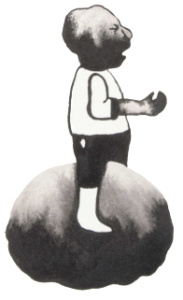During the past weeks, a number of decisions have been rendered in press cases in which Kennedy Van der Laan represented several media. Kennedy Van der Laan’s Jens van den Brink acted in these cases on behalf of the following media companies: magazine publisher Audax, public broadcaster KRO and newspaper Het Parool. The cases described below concern the reputation of a convicted serial killer, the reputation of a hotel, and the association of a hosting provider with child porn. The starting point is the freedom of speech. However, this freedom may be restricted if it is outweighed by other interests or fundamental rights, for example the right to protection of one’s reputation.
Portrait of a Serial Killer
In 1975 Willem van E. was convicted for the murders of a fifteen-year-old girl and a 44-year-old woman. After his release in 1990, he killed three women aged 23, 30 and 34, and was sentenced to life imprisonment in 2001. He became the talk of the town in 2006, because after his 65th birthday he received a state pension of €886 per month in prison. Earlier this year, the state pension for prisoners has been stopped.
The magazine Aktueel, issue 19, 2007 contains the article: “Martin K.: Always Fun in the Can” about imprisonment in the Netherlands. Top criminal Martin K.: “Are prisons severe? I am having a great time”. Martin K. also spoke about Van E.: “… after a while his state pension came in … Willem is a walking ATM machine”. The article was illustrated with a photograph of Van E., his eyes are not covered by a bar. It was also illustrated by a drawing of Martin K. that showed sexual innuendo and parody. Van E. experienced the article as unnecessarily hurtful and unlawful towards him. Audax (the publishing group behind Aktueel) has published a correction of the article and has offered Van E. an unconditional compensation of €4,000. Van E. did not settle for that and brought a legal action, claiming, among other things, a compensation of €50,000.
Honor and Reputation
The Court considered whether the publication had injured Van E.’s honor and reputation, and gave the following opinion on this. Van E. has a bad reputation in view of his conviction to a life sentence. Nevertheless, it is possible to injure this reputation further. The interest of Van E. in respect for his privacy was weighed against the freedom of expression of Audax. Because of his conviction, Van E. is a public figure who has to put up with more media attention than a non-public figure, and Audax has the freedom to expose wrongs. The Court held that the publication was unnecessarily hurtful and unlawful towards Van E., but also that Van E. has already been compensated generously by the compensation of €4,000. The Court denied the claims of Van E. and ordered him to pay the costs of the proceedings incurred by Audax, amounting to nearly €3,000. Please click here for the judgment (in Dutch).
Portrait of a Hotel
How far-reaching is the concept ‘guilty by association‘? The Mövenpick Hotel Den Bosch and its general manager argued on Friday afternoon of 28 November 2008 in the Court of Amsterdam that they were certain that the broadcast, planned for 30 November 2008, of KRO Reporter was unlawful towards them. They were of the view that in the program the Mövenpick Hotel Den Bosch was associated with crime and “painted as a breeding ground for criminals“.
KRO Reporter is an investigative journalism program and has made a report about the real estate fraud and the Philips pension fund. On the basis of information from the criminal file, a number of reconstructions were staged of meetings between the main suspects. These meetings were represented truthfully by actors and were recorded on the location where they took place. One scene concerned the transfer of a number of luxury watches at the parking lot of the Mövenpick Hotel Den Bosch. This happened on 21 December 2006 and was observed by a team of detectives. A record was drawn up of this observation in which the name of the Mövenpick Hotel in ‘s-Hertogenbosch was mentioned various times. However, the Mövenpick Hotel states that it not necessary to have the Mövenpick Hotel in the broadcast, and certainly does not want the hotel to be filmed so that it can be recognized.
Prior Measures
Section 7 of the Dutch Constitution provides: “There shall be no prior supervision of the contents of a radio or television broadcast.” The recording would only be for 25 seconds in a program of 35 minutes. The mention of the name of the hotel is an illustration to the images, and has moreover been made in a neutral and unemphatic way. Therefore, the preliminary relief judge did not consider the broadcast to be unlawful, so that there was no ground for a restriction of the freedom of speech/provision of information. The claim of the Mövenpick Hotel was denied. Please click here for the judgment (in Dutch).
Portrait of a Hosting Provider
In a ruling of the Press Council (Raad voor de Journalistiek, “RvJ”) on 18 November 2008 the complaint of hosting provider Leaseweb against the journalists Spaink and Schulte and the chief editor of Het Parool was denied. Leaseweb maintained that in the reporting by the journalists and Het Parool, Leaseweb was wrongly associated with child pornography. In their report the journalists called into question child pornography filters of providers and the police, and concluded that some websites with child pornography were housed on the server of Leaseweb. The complainant (Leaseweb) found the reporting incorrect, misleading and biased, and therefore injuring to its honor and reputation. The defendants stated, in summary, that they had not mentioned anywhere that the complainant was knowingly or willingly cooperating with obscene websites or child pornography.
First and foremost, the RvJ argued that it may be socially relevant and journalistically necessary to make a journalistic investigation into the publication of child pornography on the Internet. It is a task of the press to expose wrongs. However, careful work is in order. When a journalist publishes accusations, he has to examine whether there is a solid ground for the accusations. If possible, the journalist also hears both sides of the argument from persons involved who are discredited by a publication, even if their role in it is only a marginal one. The accused must be given ample opportunity to respond to the allegations. The conclusion of the RvJ is that the respondents have been careful, have not crossed the limits of journalistic responsibility, and therefore the complaint was dismissed as unfounded. Read the full ruling here (in Dutch).

